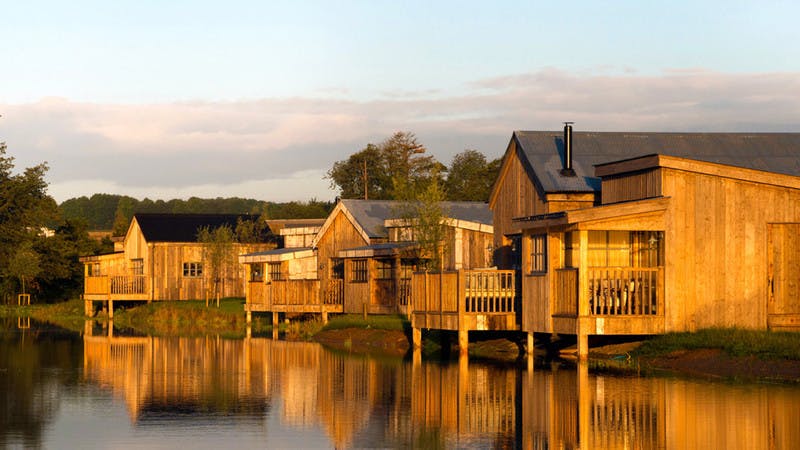What are biomass boilers?
Biomass is organic material derived from plants and animals. Burning these biological materials in a biomass boiler provides a renewable and sustainable source of heat. Biomass boilers work in a similar manner to conventional boilers, where water is heated up and then circulated to provide the heating requirements for a building. They can therefore easily be retrofitted into an existing system, as well as being installed as part of a brand new heating system.
There are 3 main types of biomass boilers; low temperature hot water (LTHW), high temperature hot water (HTHW) and steam. LTHW accounts for the vast majority of boilers sold in the UK and are typically run at temperatures no higher than 90°C, often slightly lower. LTHW biomass boilers tend to be the most common replacement for fossil fuel boilers and are used for space heating in homes, residential buildings, commercial properties such as offices, restaurants, hotels etc, and district heating systems where multiple building are connected to the same boiler. HTHW and steam biomass boilers are designed to operate at higher export temperatures than LTHW systems, typically ranging from 120 to 280°C. These are more appropriate for sites that have a high, constant heat demand, so are typically used where there is a process heat requirement on site for things such as cooking, cleaning, chemical production, along with other larger users of energy such as hospitals.
How does a biomass boiler work?
As a whole biomass boilers work in the same way that regular fossil fuel ones do, where fuel is burnt in the boiler which produces energy that is used for heating. They can provide all the same heating functions as conventional fossil fuel systems, so in terms of technical performance either will do the job as well as the other.
Most modern commercial biomass boilers will have a bulk fuel store which fuel is delivered to. There is then a fuel feed delivery system which connects the biomass boiler to the fuel store, and when there is a demand for heat the fuel is automatically conveyed to the boiler for combustion.
Once in the combustion chamber the boiler works in a different way to an open fire, where a process called gasification takes place. The fuel is automatically set a light with an igniter (hot air gun), where the fuel is then burnt at 600˚C which releases gases. Secondary combustion then occurs where air is brought in to the chamber and mixes with these gases which are then burnt off, generating temperatures of 1,200˚C .
The biomass boiler contains a heat exchanger which the hot gases pass through and heat the water contained within it. This water is then circulated away from the boiler using pumps and is used to heat buildings. Typically as part of the biomass equipment there will be thermal store which the flow and return pipework of the boiler connect on to. This is essentially a large water tank which is very well insulated and stores hot water. This then connects on to the downstream heating system like a conventional boiler would. The thermal store acts as a heat battery, with the warm water ready to be circulated when required. We have produced a news article titled "How to store biomass heat in a thermal store?" which goes into this area in more detail.
Further information this subject can also be found on a news article titled "what is biomass heating?".
What fuel do biomass boilers use?
Whilst there is a wide range of material that can be classified as biomass fuel such as grain, miscanthus and chicken litter, the vast majority of systems use 1 of 3 main types of fuel; log, wood pellet and wood chip. Logs are a popular choice of fuel for those who have access to a lot of woodland and tend to achieve the greatest fuel savings. Logs are manually loaded in to the boiler, so day to day interaction is required from the owner. More information on this fuel type can be found on our log page.
Wood pellets are a biomass fuel made from compressed sawdust, produced as a waste from sawmills. Unlike log systems which require manual filling, when connected to a bulk fuel store a pellet biomass boiler will be completely automated. More information on this fuel type can be found on our wood pellet page.
Wood chips are small pieces of wood which have been through a chipper to produce suitably sized fuel for boilers. Wood chip can be delivered in bulk, or if the fuel is self supplied from nearby land, it can be chipped directly into the fuel store. Much like pellet, once in the fuel store these are automatically fed to the biomass boiler. More information on this fuel type can be found on our wood chip page.
Along with virgin wood chip, waste / recycled wood chip can also be used in suitable systems. For certain companies this is a great way of not only saving on disposal costs for waste wood that was previously removed from site, but it also gives them a free supply of fuel to cover their heating requirements. Where not available on site, waste / recycled wood chip can also be purchased through fuel suppliers at cheaper rates than virgin wood.
Why use Treco to deliver your biomass system?
With 20 years’ experience, we are one of the UK’s longest standing, largest, and leading installers and developers of biomass boiler systems. We are highly experienced in designing, supplying, installing and maintaining this renewable energy technology and have sold approaching a thousand biomass boilers nationwide to date. Through our many years of experience, valuable lessons have been learnt which enables us to achieve a very high level of engineered precision and technical competence, and ensures the design of a highly efficient system. We have a strong belief in bringing the right solution to the right application, and will never compromise our integrity by supplying a technical solution that is inappropriate to its client’s requirements..
We have worked on a wide range of projects, from 20kW single domestic installations, to 1MW sized boilers for industrial processes. , as well as larger district heating schemes where the heating and hot water requirement for 72 houses on an estate were provided.
Below are some case studies from a selection of our installations:
Do you have any questions about a biomass installation?
Speak to our experienced team on 01884 250 790
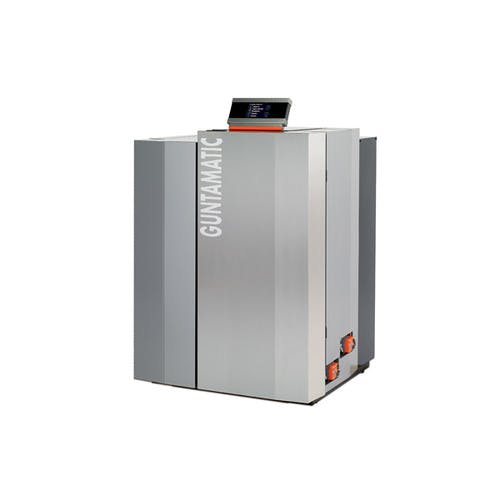
Log biomass boiler
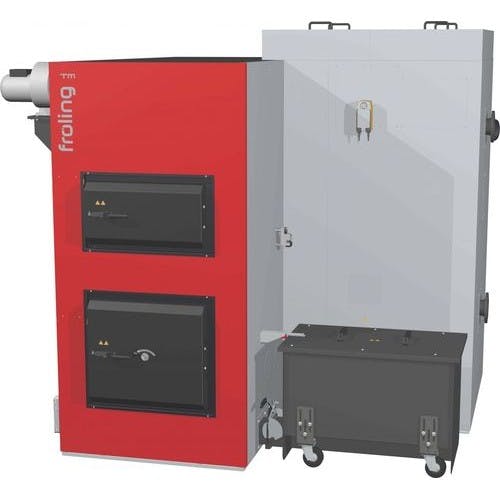
Wood chip biomass boiler
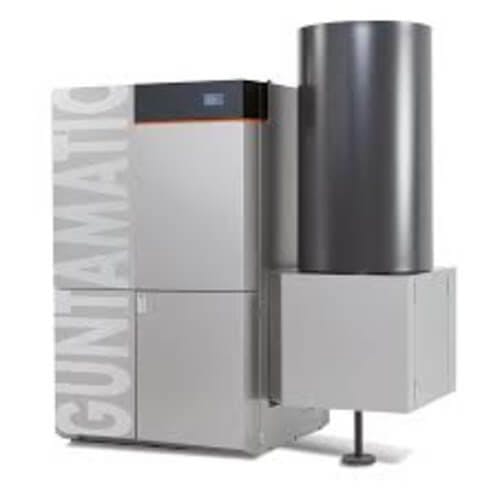
Wood pellet biomass boiler
Biomass boiler costs
How much does a biomass boiler cost?
Whilst biomass heating systems will cost more than the equivalent fossil fuel boiler, there are significant financial benefits by opting for biomass with a typical installation seeing return on investment of around 20% for 20 years. The cost of a fully installed biomass system can vary depending on a number things. If we are just considering the plant room then a biomass boiler will make up around 55% of the project cost, with the other components around 30% and finally labour will be about 15%.
A basic domestic installation with a good quality 20kW system will cost around £20k, then larger more commercial systems will be around £40,000 for a 50kW, £50,000 for a 100kW, £90,000 for a 250kW, £180,000 for a 500kW and £290,000 for a 1MW.
We have produced a news article titled "How much does a biomass boiler cost?" which goes into this area in more detail.
Are biomass boilers cheaper to run?
Commercial biomass boiler systems are capable of burning a range of fuels such as wood chip, wood pellet, logs, grains, straw and miscanthus. By switching to a biomass boiler from a fossil fuel source such as oil, you could expect to see fuel savings from anywhere between 30% to 50%, or even up to 80% if biomass is replacing electric for heating.
Further advantages are that many businesses can burn by-products produced on site, such as pallets and wood off-cuts. This not only provides some businesses free fuel, but also removes disposal costs associated with waste removal from site.
Along with the financial benefits you can also play your part in reducing carbon emissions by replacing a fossil fuel boiler with a biomass boiler.
What biomass boiler incentives are available?
The main driving force behind the success of biomass boiler installations in recent years has been the Renewable Heat Incentive (RHI). This is a government initiated scheme that was set up to encourage the use of renewable heat technologies among home owners, communities and businesses by providing financial incentives. There were two schemes, the domestic that paid applicants for 7 years and the non-domestic for 20 years.
The domestic RHI is closed to new applicants and in its place is the boiler upgrade scheme. The scheme is available in England and Wales where if the following criteria is met you can qualify for a £5,000 grant:
- Off the gas grid
- in a rural location
- chosen boiler meets emission requirements.
The boiler upgrade scheme is not available in Scotland, instead interest free loans are available to make homes more efficient.
The non-domestic RHI pays participants each quarter for every kWh of heat generated and used over the past 3 months, with the scheme lasting 20 years. Whilst the scheme is now closed to new applicants, boiler and RHI tariffs can undergo changes of ownership as well as relocations to other sites, so a new owner can benefit from the RHI for the remaining term. As the capital expenditure on commercial projects is typically paid off in around 5 years, this means installations that are 10 years old could be relocated, with the capex of the second owner paid off in 5 years, who then have 5 years further of RHI payments that they can benefit from. The payments are index linked as well, so the rate per kWh increases each year in line with the consumer price index. Further details on this scheme can be found on the RHI section of this website. We have produced a news article titled "What biomass boiler grants are available in the UK?" which goes into this area in more detail.
How much does a biomass boiler cost per year?
This very much depends on the size of the system, how often it is used, and chosen fuel type. Larger boilers have a higher output and use more fuel, so a 25kW boiler will use 25% of the fuel that a 100kW boiler will use if they are both ran at their full output for the same amount of time. As boiler sizes increase so does the cost of servicing, as more time is required per service. A boiler just used for space heating should only require a single service a year, whereas ones used for process heating will be on for much longer periods and will require 2 or 3 a year. Wood chip is also cheaper than wood pellet, so this will influence the running costs. Unfortunately it is impossible to give the annual running costs of a biomass boiler without knowing the specifics of the project. However, if you do want to get a rough idea of what it would cost you per year to run a biomass boiler, just contact us to discuss your potential project. The one thing we can be sure of is that overall a biomass boiler will be cheaper to run than a fossil fuel alternative.
Biomass Products, Information & Fuel Types
There are a number of different biomass boiler makes, models and sizes, that cover a wide range of applications. We are the importers and distributors for two of the largest Austrian manufacturers, Guntamatic and Froling, who have an extensive range of systems we can offer. We do however pride ourselves on providing the most appropriate system for you application, so will source other manufacturers systems if they are better suited for the end users applications. Further information on different types of biomass boilers can be found via the links below.
Wood chip boilers
We supply and install a range of wood chip boilers from 20kW up to 20MW in size. We pride ourselves on providing the most appropriate system for your project and will source other systems if necessary. Browse through our product range or give us a call to discuss your requirements.
Wood pellet boilers
We offer a complete range of wood pellet boilers that are suitable for almost any application. We pride ourselves on providing the most appropriate system for your project and will source other systems if necessary. Browse through our product range or give us a call to discuss your requirements.
Log boilers
We can offer a range of log boilers to meet your requirements. We pride ourselves on providing the most appropriate system for your project and will source other systems if necessary. Browse through our product range or give us a call to discuss your requirements.
Our biomass boilers
As the importers and distributors of two of the largest Austrian biomass boiler manufacturers, there's an extensive range of systems we can offer. We pride ourselves on providing the most appropriate system for your project and will source other systems if necessary.
How to buy a biomass system
Treco will be with you at every step of the way to make sure you buy the right system for your need today and for tomorrow. It all starts with a phone call and a free site visit.
Treco’s RHI calculator
Try our RHI calculator to work out the fuel cost savings, potential RHI payments and payback you can expect from your biomass project. Developed in-house by us, all you have to do is enter your boiler size, installed cost, current fossil fuel usage and your preferred biomass fuel type.
The Benefits of Biomass Heating
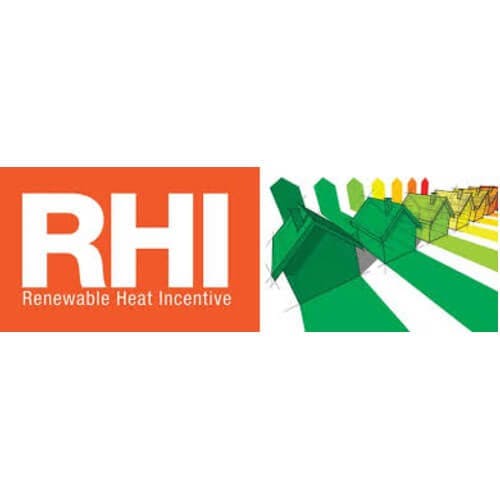
RHI payments

Fuel savings

Carbon footprint
Is a biomass system suitable for you?
Speak to one of our experienced staff on 01884 250 790
Biomass boiler FAQ
- How do biomass boilers compare to fossil fuel boilers?
There are some drawbacks when it comes to biomass vs conventional boilers, with the main ones being the capital expenditure and spatial requirements. A plant room installation of a biomass boiler will be two or three times more expensive than a fossil fuel system of the same size. A biomass system and all the required equipment will also take up more room than the same sized fossil fuel system. Depending on the fuel type as well, there needs to be some consideration in terms of fuel deliveries for biomass on a commercial scale, as it can involve large vehicle movements (a similar thing can also be said for oil delivery).
There are however significant financial benefits associated with a biomass boiler when compared to conventional heating system. In most cases biomass is cheaper than fossil fuel, with average savings typically being around 30%. Biomass systems also allow the owner to claim RHI payments for the heat used on site. When both of these are combined the typical payback period for projects is around 5 years, with the non-domestic RHI lasting for a total of 20 years. Whilst the capital expenditure is higher to begin with, ultimately the system pays for itself and provides a healthy return on investment for 20 years. As well as the financial benefits, switching to biomass also benefits the environment by helping you reduce your carbon footprint.
- Are biomass boilers reliable?
If biomass boilers are installed correctly, provided with the correct specification fuel, and are serviced and maintained then they are very reliable.
- How long do biomass boilers last?
If biomass boilers are installed correctly, the right specification fuel is used, and they are serviced and maintained correctly, then they will far exceed the 20 years that the RHI runs for. This is longer than the 10 to 15 year lifetime fossil fuel boilers typically have. Like any bit of machinery there will be parts that need to be replaced along the way, but the system will last. Parts will need replacing, which is why its important to go with a manufacturer (as well as installer) with a good reputation that you can be confident will be around to provide parts and support you for the lifetime of the boiler.
- Are biomass boilers environmentally friendly?
Biomass boilers are more environmentally friendly than fossil fuel boilers. They are largely considered carbon neutral as they only release the amount of carbon that has already been adsorbed by trees. The Carbon Trust have released figures that show the amount of carbon dioxide produced per kWh of various fossil fuel types, with the results as follows; mains gas 0.1836 kg, LPG 0.2147 kg, oil 0.2468 kg. These figures are all direct, meaning it is only based on the emissions emitted at the point of use. They do not include indirect emissions which are those associated with the extraction of the fuels and production so they are ready for use. The 3 main types of biomass fuel are log, chip and pellet. Of these 3 pellets produce the highest emissions as they have more indirect factors associated with them e.g. turning sawdust to pellets. Factoring in for both direct and indirect, the Carbon Trust state pellets produce 0.039 kg of carbon dioxide per kWh. This shows that pellets produce around 5 times less carbon dioxide than mains gas (the lowest of the fossil fuels), however that is not like for like as the pellet figures include for indirect factors.
- Do I need planning permission for my biomass boiler?
Planning permission is typically not required for most domestic biomass boiler installations. As long as the flue is on the rear or side wall and does not exceed 1m above the highest part of the building, then it should be considered as permitted development.
Similarly, the installation of a biomass boiler and flue on a non-domestic property should also come under permitted development if the boiler is 45kW or below and the flue is less the 1m above the highest part of the building. If over 45kW then planning permission is always required.
If the property is listed or in a designated area, it is advisable to contact your Local Authority to see if there are any additional requirements.
We have produced an article titled 'Do I need planning permission for a biomass boiler?' which has some additional informational.
- Are biomass boilers noisy?
Biomass boilers maximum noise levels should be below <70db. This means that the majority of the time they will be operating a levels similar to that of a conversation between 2 people. As most systems will be in there own plant room and away from people, they should not really be heard at all.
- How efficient are biomass boilers?
Most modern biomass boilers will have a burn efficiency of 90 to 95%. This is the same as a brand new condensing boiler, though older oil boilers will likely be around 60 to 70% efficient. It is important to ensure good quality fuel is used and that system is serviced as per the manufactures recommendations to ensure the efficiency levels are kept.
- How to chose a biomass boiler?
There are a number of key considerations when picking a biomass boiler such as fuel type, make, size, warranty and support to name a few. The biomass system is just one part of a total system though, essentially the engine to your car and there are many of components that are integral in having a fully functioning system. Move away from the physical components there are other important considerations like how the fuel is going to be delivered to the store. We have written various articles like 'key considerations in specifying a biomass boiler system' which will give you a good bit of background information. There are a lot of things to consider though and the best way to get your head around things is to give us a call and discuss your potential project.
- What size biomass boiler do I need?
There are various ways of calculating what size biomass boiler you need. If you have an existing boiler and it is coping with your heating requirements, then looking at the output on the boiler plate will give you a good idea of what size biomass boiler you need. That said, quite often fossil fuel boilers are oversized, so there is a good chance you could get away with a biomass boiler with a smaller output. If you have meter readings and / or know how much fuel you have used over what period then we can use this to calculate what size boiler you require. Prior to selling a boiler a technical site survey is undertaken which measures the size of your property as well as looking at the fabric of the building and how well insulated it is. This data is then used to calculate how much heat is lost through the building per hour, and that determines the size of the boiler that's required.
- What problems do biomass boilers have?
As long as biomass boilers are installed correctly and the right fuel is used, then they should have no more issues than a fossil fuel boiler. With over 800 systems sold ourselves as well as having a consultancy service that supports anyone with a problematic system, we have come across and rectified a range of issues over the past 20 years.
The main issues we tend to see are poor levels of efficiency, bad combustion, and insufficient heat being provided to buildings. These are typically caused by poor fuel quality and the way the system has been installed and commissioned.
As opposed to going into great detail here, we recommend you read the article we have specifically written about this titled "Biomass boiler problems..........and how to fix them".
- What is biomass heating?
Simply put, this is providing heating using a biomass boiler which uses wood as fuel. A detailed discussion on how a biomass heating system operates can be reviewed on our What is biomass heating? blog page.
- Biomass installers near me
In an ideal world your chosen biomass installer would be located next door to you. It is however quite a specialist industry and areas are not saturated with companies that deal with biomass heating systems like you get with gas boilers. Rather than picking the company closest to you, its more important to find the right company to work with that have a proven track record in designing and delivering the most appropriate biomass heating system for your requirements, and have the technical knowledge and engineer base to be able to support you moving forward.
